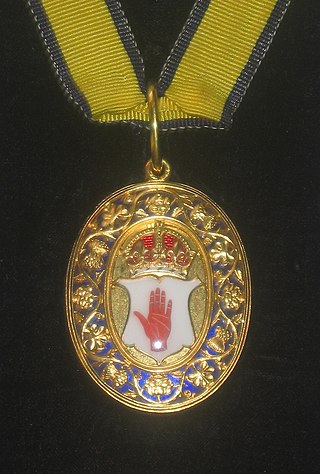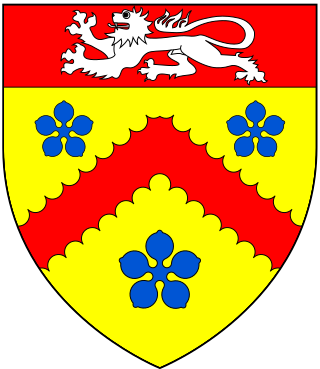Cobb baronets, of Adderbury (1662)

- Sir Thomas Cobb, 1st Baronet (1627– February 1699) [1]
- Sir Edward Cobb, 2nd Baronet (c. 1676–1744)
- Sir George Cobb, 3rd Baronet (c. 1670–29 March 1762)
The Cobb Baronetcy, of Adderbury in Oxfordshire, was a title in the Baronetage of England. It was created on 9 December 1662 for Thomas Cobb. [1] [2] The title became extinct on the death of the third Baronet on 29 March 1762.


There have been six baronetcies created for persons with the surname Smyth, two in the Baronetage of England, one in the Baronetage of Great Britain, one in the Baronetage of Ireland and two in the Baronetage of the United Kingdom. One creation is extant as of 2010.

Viscount Hewett was a title in the Peerage of Ireland. It was created on 9 April 1689 for Sir George Hewett, 2nd Baronet. He was made Baron of Jamestown at the same time, also in the Peerage of Ireland. The Hewett Baronetcy, of Pishiobury in the County of Hertford, was created in the Baronetage of England on 19 July 1660 for Thomas Hewett, Member of Parliament for Windsor. Both titles became extinct on the first Viscount's death in 1689.
Nineteen baronetcies have been created for persons with the surname Hamilton, eight in the Baronetage of Nova Scotia, one in the Baronetage of England, five in the Baronetage of Ireland, one in the Baronetage of Great Britain and four in the Baronetage of the United Kingdom. As of 2008 two creations are extant, two are dormant, two are either extinct or dormant and twelve extinct.
There have been six baronetcies created for persons with the surname of Lawson, two in the Baronetage of England and four in the Baronetage of the United Kingdom. Two creations are extant as of 2010.
There have been nine baronetcies created for persons with the surname Lloyd, three in the Baronetage of England, three in the Baronetage of Great Britain and three in the Baronetage of the United Kingdom. Two of the creations are extant as of 2010.

There have been twenty one baronetcies created for persons with the surname Williams, eight in the Baronetage of England, three in the Baronetage of Great Britain and ten in the Baronetage of the United Kingdom. Only six of the creations are extant as of 2017.
There have been nine baronetcies created for persons with the surname Moore, two in the Baronetage of England, one in the Baronetage of Ireland, two in the Baronetage of Great Britain and four in the Baronetage of the United Kingdom. As of 2014 two creations are extant and one is considered dormant.
There have been five baronetcies created for persons with the surname Ward, one in the Baronetage of England, one in the Baronetage of Ireland and three in the Baronetage of the United Kingdom. See also Warde baronets.

There have been six baronetcies created with the surname of Leigh: two in the Baronetage of England, one in the Baronetage of Ireland, one in the Baronetage of Great Britain and two in the Baronetage of the United Kingdom. The only creation remaining extant is that of Altrincham, while another is dormant.

The Hales Baronetcy, is a title in the Baronetage of England. There were three Hales baronetcies. The oldest was created in 1611 for Edward Hales. He was a member of a Kent family. The second was created in 1660 for Robert Hales, MP for Hythe 1659, also of a Kent family. The third was created in 1660 for John Hales of Coventry, co. Warwick.
Three baronetcies were created for persons with the surname D'Oyly, two in the Baronetage of England and one in the Baronetage of the United Kingdom. One creation is extant as of 2008.
There have been seven baronetcies created for persons with the surname Powell, five in the Baronetage of England and two in the Baronetage of the United Kingdom. Only one creation is extant as of 2007.

The Worsley family is an English family that is derived from Sir Elias de Workesley, a Norman knight who was a youth at the time of the Norman conquest. He later accompanied Duke Robert II of Normandy on the First Crusade and was buried at Rhodes.
There have been four baronetcies created for persons with the surname Rich, two in the Baronetage of England, one in the Baronetage of Great Britain and one in the Baronetage of the United Kingdom. As of 2008 three of the creations are extinct while one is dormant.
There have been two baronetcies created for members of the Reade family, both in the Baronetage of England. Both creations are now extinct.

There have been three baronetcies created for persons with the surname Cooke, two in the Baronetage of England and one in the Baronetage of Ireland. One creation is extant as of 2013.

There have been three baronetcies created for persons with the surname Carew, two in the Baronetage of England prior to 1707, one in the Baronetage of Great Britain.

There have been four baronetcies created for members of the ancient House of Beaumont, all in the Baronetage of England. All four creations are extinct or dormant.

The baronetcy of Conyers of Horden was created in the Baronetage of England on 14 July 1628 for John Conyers of Horden, County Durham.
The Wolstenholme Baronetcy, of London, was a title in the Baronetage of England. It was created on 10 January 1665 for John Wolstenholme, who had previously represented West Looe, Newport and Queenborough in Parliament. He had been heavily fined by the Parliamentarians for supporting the Royal cause during the Civil War. The third Baronet sat as Member of Parliament for Middlesex. The title became extinct on the death of the seventh Baronet in 1762.